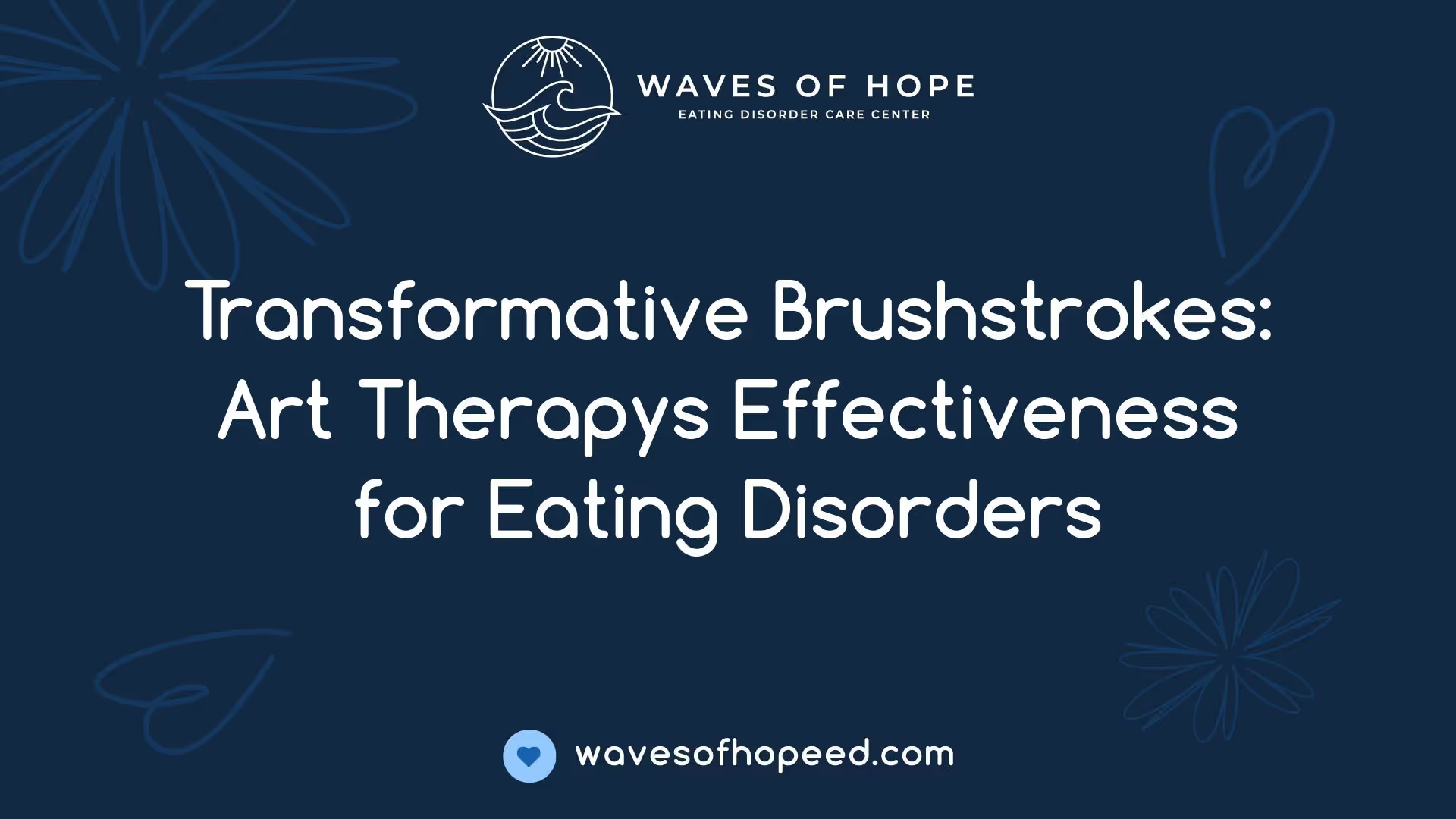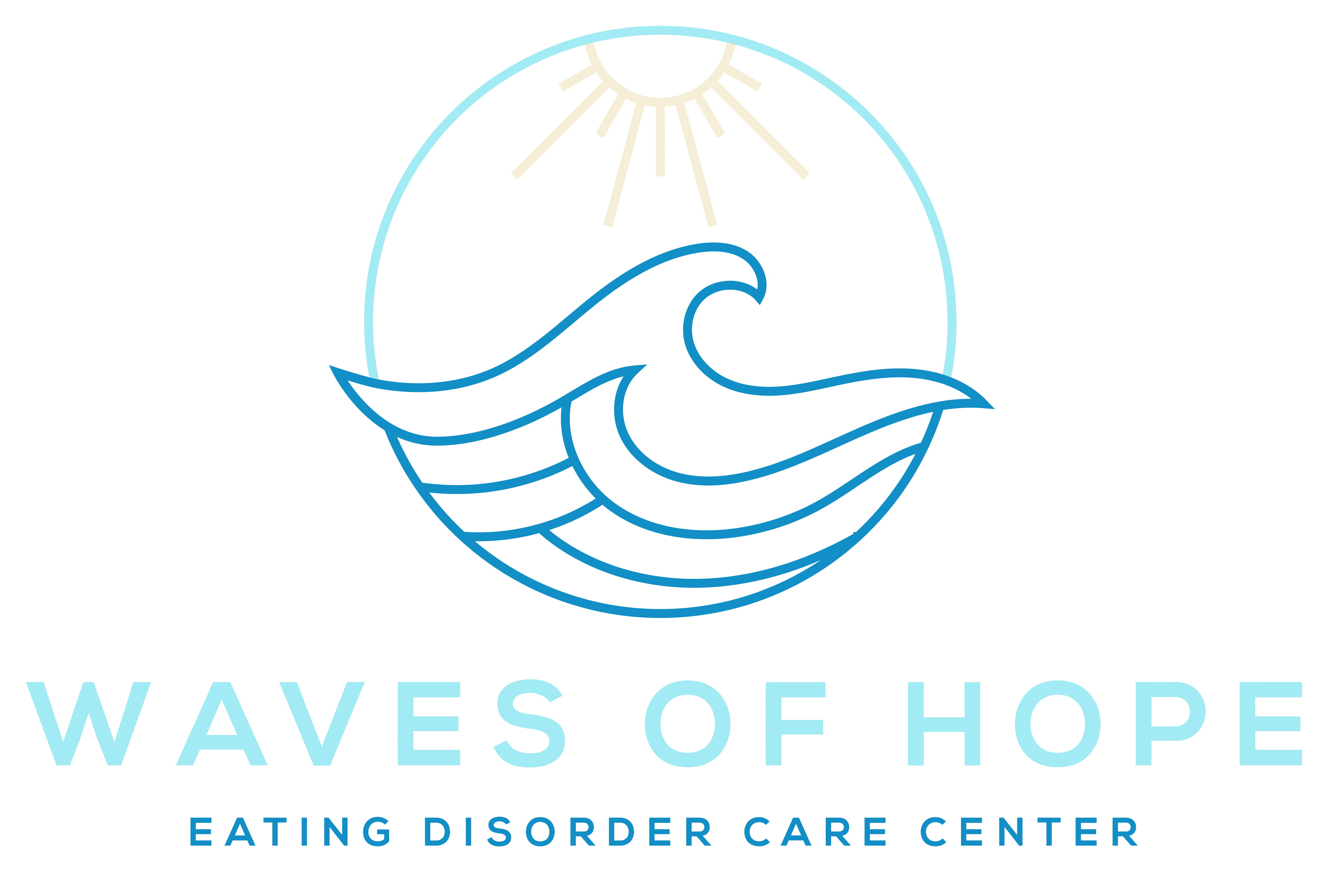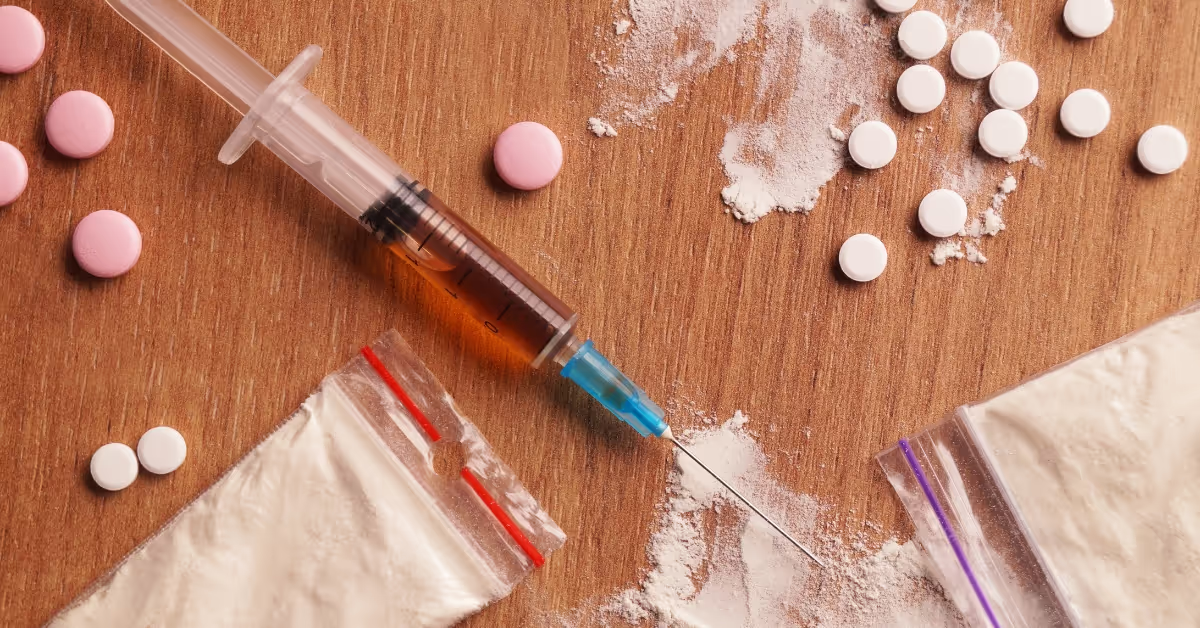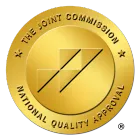.avif)
Art Therapy for Eating Disorders
Understanding Eating Disorders and Their Impact
Eating disorders are complex mental health conditions characterized by unhealthy eating behaviors and a distorted body image. Common types include anorexia nervosa, bulimia nervosa, and binge-eating disorder. These conditions can have severe emotional, physical, and social consequences.

The impact of eating disorders can be profound. Individuals may experience physical health problems such as heart issues, digestive complications, and delayed growth. Emotionally, eating disorders can lead to anxiety, depression, and low self-esteem. Socially, individuals may withdraw from relationships and activities, further exacerbating their condition.
Impact AreaEffectsPhysical HealthHeart issues, digestive problems, malnutritionEmotional HealthAnxiety, depression, low self-esteemSocial LifeWithdrawal from relationships and activities
Introduction to Art Therapy as a Treatment
Art therapy is a therapeutic approach that utilizes creative processes to help individuals express emotions and enhance psychological well-being. In the context of eating disorders, art therapy serves as a powerful tool for communication and self-exploration.
Art therapy encourages individuals to create art without the pressure of traditional artistic standards. This can provide a safe space for expression, allowing individuals to visualize their feelings related to food, body image, and identity. The non-verbal nature of art can be particularly beneficial for those who find it difficult to articulate their thoughts and experiences verbally.
A qualified art therapist guides the process, helping individuals discover insights into their experiences while fostering resilience and self-acceptance. This form of therapy complements traditional treatment methods, offering a holistic approach to recovery.
Effectiveness of Art Therapy
Art therapy has emerged as a valuable treatment approach for individuals contending with eating disorders. Its structured use of creative expression allows for unique therapeutic interactions that can lead to significant benefits.
Benefits of Art Therapy for Eating Disorders
Art therapy provides numerous advantages for individuals facing eating disorders. It fosters emotional expression, enhances self-esteem, and encourages a healthy relationship with food and body image.
The following table outlines the key benefits of art therapy:
BenefitDescriptionEmotional ExpressionAllows individuals to express feelings that may be difficult to articulate verbally.Self-Esteem EnhancementPromotes self-acceptance and can improve body image.Coping Skills DevelopmentTeaches strategies for managing anxiety and stress linked to eating behaviors.MindfulnessEncourages present-moment awareness, reducing preoccupations with food and weight.Social InteractionFacilitates connection with peers, reducing feelings of isolation.
How Art Therapy Supports Recovery
Art therapy supports recovery in multiple ways. It helps individuals explore underlying emotional issues related to their eating habits while providing a non-threatening environment.
The following table highlights how art therapy aids in the recovery process:
Support AspectExplanationSelf-DiscoveryEngages patients in exploring their identity beyond eating behaviors.Safe OutletProvides a creative outlet for expressing frustrations and fears associated with eating disorders.Goal SettingAssists in setting and achieving personal recovery goals through creative projects.EmpowermentEncourages individuals to take control of their healing journey through creative choices.Non-Judgmental SpaceCreates an environment free of judgment, allowing individuals to express themselves openly.
The effectiveness of art therapy for people with eating disorders is evidenced by its numerous benefits and the holistic support it offers throughout the recovery process. By focusing on creativity, individuals can confront and work through challenges in a uniquely supportive manner.
Types of Art Therapy Techniques
Art therapy consists of various techniques that can be particularly effective for individuals dealing with eating disorders. By utilizing different art forms, therapists can help clients express emotions, confront feelings, and work toward recovery. The following sections explore two primary approaches within art therapy: the use of visual art and incorporating creativity for healing.
Use of Visual Art in Therapy
Visual art techniques are a staple in art therapy, enabling clients to create tangible representations of their feelings and perceptions. This form of expression can be beneficial for individuals who struggle to articulate their emotions verbally.
Some common visual art techniques include:
TechniqueDescriptionDrawingClients can use pencils, charcoal, or markers to illustrate their thoughts and emotions.PaintingUtilizing various paint mediums, clients can explore themes, colors, and textures that resonate with their feelings.CollageBy combining multiple visual elements from magazines, photos, or found objects, clients can create a narrative that reflects their experiences.Sculpture3D art forms allow clients to manipulate materials, providing tactile engagement that can enhance emotional release.
These techniques offer individuals a unique way to confront and process their emotions, which can be particularly valuable in the context of eating disorders where self-image and emotions often intertwine.
Incorporating Creativity for Healing
Creativity plays a crucial role in art therapy, serving as a pathway for self-discovery and healing. Engaging in creative activities allows clients to explore different aspects of themselves, fostering a sense of empowerment and ownership over their recovery journey.
Key components of incorporating creativity include:
ComponentDescriptionImprovisationClients can experiment with spontaneous art-making, free from judgment, which can relieve anxiety and foster openness.StorytellingUsing narrative-based art, clients can share their experiences through visual and spoken storytelling, promoting communication and connection.Group ActivitiesCollaborative projects encourage social interaction and help build a supportive community, addressing feelings of isolation often associated with eating disorders.Art JournalingKeeping a visual diary allows clients to document their thoughts and emotional progress over time, serving as a reflective tool in their healing process.
Incorporating these creative methods not only enhances the therapeutic experience but also empowers individuals to connect with their inner selves, facilitating meaningful progress in managing their eating disorders.
Connection Between Art and Healing
Art therapy has gained recognition for its potential in the recovery process for individuals with eating disorders. It fosters a unique connection between artistic expression and overall healing.
Expressive Arts Therapy
Expressive arts therapy combines various forms of creative expression—including visual art, music, dance, and drama—to facilitate healing and personal growth. This multifaceted approach allows individuals to explore their emotions, thoughts, and experiences in a safe environment.
Research has shown that expressive arts therapy can offer significant benefits to those struggling with eating disorders. The table below illustrates various benefits associated with this therapeutic approach.
BenefitDescriptionEmotional ExpressionProvides a non-verbal outlet for feelings.Self-DiscoveryEncourages exploration of personal identity.Stress ReductionPromotes relaxation and reduces anxiety levels.Enhanced Communication SkillsFosters better expression of thoughts and needs.
Role of Self-Expression in Recovery
Self-expression is a pivotal component of the healing process for individuals facing eating disorders. Engaging in creative activities allows for the exploration of difficult emotions and experiences, which can be challenging to express verbally.
Studies indicate that increased self-expression is linked to improved mental health outcomes. The following table highlights key aspects of self-expression in recovery.
AspectImpact on RecoveryBuilds ConfidenceEnhances self-esteem and personal worth.Fosters ResilienceEncourages coping mechanisms during challenges.Improves Body ImageShifts focus from negative body perceptions to positive self-acceptance.Strengthens Support NetworksCreates community opportunities and shared experiences.
The integration of expressive arts therapy into treatment options for eating disorders underscores the effectiveness of art therapy in fostering healing and personal growth. Through self-expression and creative exploration, individuals can navigate their recovery journeys with greater understanding and support.
Implementing Art Therapy Programs
Effectively implementing art therapy programs for individuals dealing with eating disorders requires careful planning and structure. This section will explore how to structure art therapy sessions and integrate art therapy into comprehensive treatment plans.
Structuring Art Therapy Sessions
Art therapy sessions are designed to provide a safe and supportive environment for self-expression and emotional exploration. Each session typically follows a structured format to maximize benefits. Below is a common structure for art therapy sessions:
Session ComponentDescriptionCheck-InParticipants share their feelings and experiences since the last session. This promotes connection and trust.Art ActivityGuided art activity tailored to themes related to recovery and self-reflection. This may include drawing, painting, or sculpting.DiscussionParticipants discuss their art creations and the emotions tied to them. This encourages insight and reflection on personal experiences.Wrap-UpA summary of the session highlights the progress made and sets goals for the next session.
These components are adaptable based on the needs of the group or individual. Flexibility allows therapists to respond to the emotional climate and specific challenges faced by participants.
Integrating Art Therapy into Treatment Plans
Art therapy should be part of a holistic treatment approach when addressing eating disorders. Integration into comprehensive treatment plans can enhance overall effectiveness. Below are key strategies for incorporating art therapy into treatment.
Integration StrategyDescriptionAssessmentConduct assessments to understand how art therapy can meet individual needs and align with treatment goals.CollaborationWork with other healthcare professionals, such as dietitians and psychologists, to ensure a cohesive approach to patient care.Goals and ObjectivesEstablish clear goals and objectives for art therapy sessions that align with the patient's recovery journey.Progress MonitoringRegularly evaluate the effectiveness of art therapy through feedback and progress tracking to adapt treatment plans as necessary.
These strategies help maintain a unified treatment direction and facilitate comprehensive healing for individuals with eating disorders. Structured sessions coupled with strategic integration create a supportive environment conducive to recovery through art therapy.
Considerations and Support
Importance of Qualified Art Therapists
Engaging in art therapy requires skilled professionals who are trained to handle the complexities associated with eating disorders. Qualified art therapists possess specialized knowledge in both psychological and artistic fields. Their expertise is crucial for facilitating a safe environment where individuals can express themselves without judgment.
Key attributes of qualified art therapists include:
AttributeDescriptionEducationAdvanced degrees in art therapy or related fields.CertificationCredentials from recognized art therapy organizations.ExperiencePractical experience working with individuals facing eating disorders.Understanding of TechniquesKnowledge of various art techniques and therapeutic practices.
Qualified therapists can better assess an individual's needs and tailor art therapy sessions to promote emotional healing while addressing the specific challenges related to eating disorders.
Long-Term Benefits and Support for Recovery
Art therapy can have lasting impacts beyond immediate emotional relief. Over time, individuals engaging in art therapy often experience significant improvements in various areas of their lives, contributing to sustainable recovery from eating disorders.
Some potential long-term benefits include:
BenefitDescriptionEnhanced Self-EsteemArt production fosters a sense of accomplishment and self-worth.Improved Coping SkillsArtistic expression provides tools to manage difficult emotions.Strengthened RelationshipsParticipants often build connections with others through shared art experiences.Increased Emotional AwarenessArt therapy encourages individuals to explore and understand their feelings more deeply.
Support systems, including continued engagement with qualified art therapists and community art programs, play an essential role in maintaining progress. Ongoing therapeutic relationships provide a framework for individuals to navigate challenges and reinforce the skills learned during treatment.




.svg)















































.jpg)
.jpg)
.jpg)
.jpg)
.jpg)
.jpg)
.jpg)
.jpg)
.jpg)
.jpg)
.jpg)
.jpg)
.jpg)
.jpg)
.jpg)
.jpg)
.jpg)
.jpg)
.jpg)
.jpg)
.jpg)
.jpg)
.jpg)
.jpg)
.avif)
.avif)

.avif)
.avif)
.avif)
.avif)
.avif)
.avif)
.avif)
.avif)
.avif)
.avif)
.avif)
.avif)
.avif)
.avif)
.avif)
.avif)
.jpg)
.avif)
.avif)
.avif)
.avif)
.avif)

.avif)

.avif)
.avif)
